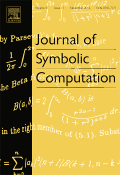
JOURNAL OF SYMBOLIC COMPUTATION
metrics 2024
Advancing the Frontiers of Mathematical Insight
Introduction
The JOURNAL OF SYMBOLIC COMPUTATION, published by Academic Press Ltd - Elsevier Science Ltd, serves as a prominent platform for researchers, professionals, and students in the field of mathematics. With an ISSN of 0747-7171 and E-ISSN of 1095-855X, this esteemed journal has been at the forefront of advancing knowledge in symbolic computation since its inception in 1985. The journal is categorized within the Q2 quartile for both Algebra and Number Theory and Computational Mathematics, reflecting its growing influence in these critical areas, as evidenced by its Scopus rankings—ranking 27 out of 119 in Algebra and 104 out of 189 in Computational Mathematics. Researchers can access a wealth of cutting-edge research articles that explore the intricacies of algorithms, algebraic models, and computational methodologies. As it converges towards its 40th anniversary in 2025, the JOURNAL OF SYMBOLIC COMPUTATION continues to be an indispensable resource for advancing theoretical and practical applications in mathematical computation.
Metrics 2024
 0.52
0.52 0.60
0.60 0.70
0.70 65
65Metrics History
Rank 2024
Scopus
IF (Web Of Science)
JCI (Web Of Science)
Quartile History
Similar Journals

Genetic Programming and Evolvable Machines
Innovating the Future of Evolutionary ComputationGenetic Programming and Evolvable Machines, published by SPRINGER, is a leading journal dedicated to the fields of genetic algorithms, evolutionary computation, and machine learning. With an ISSN of 1389-2576 and an E-ISSN of 1573-7632, this esteemed journal encompasses original research articles, reviews, and applications that explore the intricate relationships between intelligent systems and evolutionary processes. As of 2023, it holds a notable Q2 ranking in various categories including Computer Science Applications and Hardware and Architecture, reflecting its significant impact in advancing knowledge and methodologies within these domains. The journal's metrics, including a top rank of #31/130 in Theoretical Computer Science, signify its relevance and contribution to the broader academic community. Though not open access, papers published in the journal continue to serve as critical resources for both researchers and practitioners, promoting innovative methodologies and solutions. Covering a broad scope with a convergence extending from 2003 to 2024, this journal remains a pivotal platform for sharing cutting-edge research that shapes the future of artificial intelligence and computational theory.

ALGEBRA UNIVERSALIS
Pioneering Research in Algebra and BeyondALGEBRA UNIVERSALIS is a prestigious academic journal published by Springer Basel AG, dedicated to the exploration and advancement of mathematical research, particularly within the realms of algebra, number theory, and logic. Established in 1971, this journal continues to provide a platform for innovative research and discourse, contributing significantly to its fields of study over more than five decades. With its current classification in the Q2 quartile for both Algebra and Number Theory and Logic, ALGEBRA UNIVERSALIS ranks prominently within the mathematical community. Although it is not an open-access journal, it offers numerous subscription options for individuals and institutions seeking to stay current with the latest developments and findings. The journal’s commitment to quality research makes it an essential resource for researchers, professionals, and students aiming to deepen their understanding and knowledge of advanced mathematical theories and methodologies.
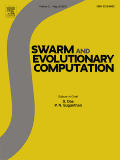
Swarm and Evolutionary Computation
Exploring the Frontiers of Intelligence and Evolution.Swarm and Evolutionary Computation is an esteemed academic journal published by Elsevier, dedicated to the exploration of innovative algorithms and methodologies derived from principles of swarm intelligence and evolutionary computation. With its ISSN 2210-6502 and E-ISSN 2210-6510, this journal has earned a prominent position in the field, evidenced by its Q1 category rankings in both Computer Science and Mathematics for 2023, reflecting its high impact and relevance. The journal's Scopus rankings further underscore its significance, placing it in the top percentile of mathematics and computer science journals. As an open-access platform, it aims to disseminate groundbreaking research that addresses real-world challenges and fosters interdisciplinary collaboration. Researchers, professionals, and students are encouraged to engage with this journal to contribute to and benefit from the ongoing advancements in swarm intelligence and evolutionary methods, which have become instrumental in solving complex optimization problems across diverse fields.

ALGORITHMICA
Connecting Researchers with Cutting-edge Algorithmic DiscoveriesALGORITHMICA is a premier academic journal published by SPRINGER, dedicated to the field of algorithms and their applications across various domains. With an ISSN of 0178-4617 and an E-ISSN of 1432-0541, this journal serves as a vital resource for researchers and practitioners interested in the theoretical and practical aspects of algorithmic design and analysis. Recognized for its high impact, ALGORITHMICA is listed in the top quartile (Q1) for Applied Mathematics and Computer Science (miscellaneous) and is positioned in Q2 for Computer Science Applications in the 2023 category rankings. The journal has continuously contributed to advancing knowledge from its inception in 1986 to its ongoing publications through 2024. With a commitment to rigorous peer review and high-quality research, ALGORITHMICA is essential for anyone serious about pushing the boundaries of algorithmic study and application.
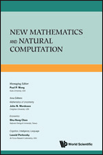
New Mathematics and Natural Computation
Bridging Disciplines: Where Mathematics Meets Natural ComputationNew Mathematics and Natural Computation, published by World Scientific Publishing Co Pte Ltd, is a pivotal journal in the realms of applied mathematics and computational theories, catering to a diverse audience of researchers, professionals, and students. With an ISSN of 1793-0057 and E-ISSN 1793-7027, this journal serves as a critical platform for disseminating innovative research and methods that intertwine mathematical theories with natural computation processes. Operating from Singapore, it emphasizes accessibility and collaboration in advancing interdisciplinary knowledge, despite its current Q4 rankings across relevant categories such as Applied Mathematics and Human-Computer Interaction—highlighting the journal’s commitment to growth and improvement in a competitive publishing landscape. As a source of insightful findings and applications in mathematics and computer science, it invites contributors to explore the dynamic intersections between these fields and foster academic dialogue. Researchers aiming to engage with cutting-edge advancements will find this journal instrumental for their work from its inaugural issue in 2012 through its projected publications into 2024.

Beitrage zur Algebra und Geometrie-Contributions to Algebra and Geometry
Bridging Theory and Application in MathematicsBeitrage zur Algebra und Geometrie - Contributions to Algebra and Geometry is a distinguished journal published by Springer Heidelberg, situated in Germany. With a focus on the intricate fields of Algebra and Number Theory and Geometry and Topology, this journal serves as a pivotal platform for the dissemination of innovative research and critical insights from scholars worldwide. Holding a commendable Q3 category ranking in both disciplines as of 2023, it is recognized for its contribution to advancing theoretical foundations and practical applications. The journal has consistently engaged the mathematical community since its inception in 2000, with a specific publication timeline that spans 2000 to 2002 and 2004 to 2024. Despite its absence of open-access options, the journal's articles are pivotal for researchers, professionals, and students seeking authoritative and impactful studies in algebra and geometry. Join an esteemed readership eager to explore and expand upon the boundaries of mathematical inquiry through this exceptional publication.

COMMUNICATIONS IN MATHEMATICAL PHYSICS
Unlocking New Dimensions in Mathematical PhysicsCOMMUNICATIONS IN MATHEMATICAL PHYSICS is a premier journal in the realm of mathematical physics, published by Springer and recognized for its rigorous scholarship and comprehensive coverage of the field since its inception in 1965. With an impressive impact factor reflecting its influential contributions—ranking Q1 in both Mathematical Physics and Statistical and Nonlinear Physics—the journal consistently attracts high-quality submissions. It holds notable standings in Scopus, ranked 11th in Mathematical Physics and 12th in Statistical and Nonlinear Physics, marking it as a critical venue for both emerging and established researchers. The journal is dedicated to the dissemination of groundbreaking research and reviews, thereby fostering dialogue and innovation in a constantly evolving discipline. It provides invaluable access to cutting-edge theoretical advancements, making it an essential resource for professionals and students alike engaged in this dynamic field of study.

CANADIAN JOURNAL OF MATHEMATICS-JOURNAL CANADIEN DE MATHEMATIQUES
Advancing mathematical excellence, one article at a time.Canadian Journal of Mathematics - Journal Canadien de Mathématiques is a prestigious peer-reviewed journal published by Cambridge University Press, which aims to advance the field of mathematics through the dissemination of high-quality research articles. With its ISSN 0008-414X and E-ISSN 1496-4279, the journal plays a pivotal role in fostering mathematical research and collaboration. It has been recognized for its impactful contributions, currently holding a category quartile ranking of Q2 in Mathematics (miscellaneous) for 2023 and sits in the 66th percentile among its peers according to Scopus rankings. As the journal continues its convergence from its inception in 1994 through to 2024, it remains a vital resource for researchers, professionals, and students seeking to stay at the forefront of mathematical developments. The journal does not operate under an open access model, allowing for a curated collection of articles that adhere to rigorous academic standards.
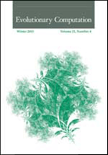
EVOLUTIONARY COMPUTATION
Shaping the Future of Algorithms with Evolutionary InsightsEVOLUTIONARY COMPUTATION, published by MIT PRESS, is a premier journal in the field of Computational Mathematics, holding a distinguished Q1 ranking in the 2023 category and an impressive 87th percentile in Scopus rankings for Computational Mathematics. Since its inception in 1996, the journal has served as a critical platform for presenting cutting-edge research and development in the applications and theory of evolutionary algorithms. Recognized for its rigorous peer-review process, EVOLUTIONARY COMPUTATION invites contributions that advance the understanding of algorithmic strategies inspired by natural evolution, thereby playing a significant role in the scientific community. The journal is pivotal for researchers, professionals, and students aiming to explore innovative methodologies and applications of evolutionary techniques in diverse fields. With a focus on fostering collaboration and knowledge dissemination, this journal not only serves the academic community but also impacts industry practices, encouraging the integration of these evolutionary approaches into real-world problems.
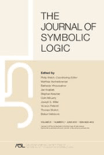
JOURNAL OF SYMBOLIC LOGIC
Advancing Knowledge in Symbolic LogicThe JOURNAL OF SYMBOLIC LOGIC, published by Cambridge University Press, stands as a leading platform for scholarly discourse in the realms of logic and philosophy. With a rich history dating back to 1938, this esteemed journal is dedicated to presenting cutting-edge research that pushes the boundaries of knowledge within symbolic logic and its applications. In 2023, it proudly holds a distinguished Q1 ranking in both Logic and Philosophy categories, reflecting its high impact and relevance in the academic community. Researchers and academics benefit from its rigorous peer-review process and contributions from leading scholars worldwide, ensuring the dissemination of high-quality research and critical theories. While the journal currently does not operate under an open access model, it remains a pivotal resource for professionals seeking to deepen their understanding of logical theories and philosophical inquiries. Explore the JOURNAL OF SYMBOLIC LOGIC to engage with scholarly articles that challenge conventional thought and inspire future research.